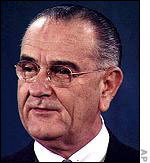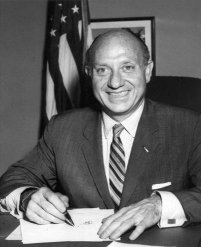Alliance for Progress
A Marshall Plan for Latin America
Communists... are what they call their rivals. Economic Developers... are what they call their allies but they are one and the same in practice.
Alianza para el Progreso
On March 13, 1961 President John F. Kennedy announced his Latin American agenda in an address at a reception for members of Congress and Latin American republics' diplomatic corps.
|
|
|||
|
|
|
|
|
|
|
|||
The Marshall Plan was a proposal by Secretary of State George C. Marshall to provide funding for rebuilding Europe after WWII. The Alliance for Progress was a Marshall Plan for Latin America not for post war rebuilding - rather it was for economic development. Kennedy's program clearly had support from the Congress because during his brief stint in the presidency, he succeeded in setting up the institutional infrastructure for what would eventually become the means for extraction of American wealth to foreign countries through foreign aid and trade. The legislative summary for JFK's international agenda can be viewed on the JFK Presidential Library2.
The Office of the Historian of the State Department3 wrote this:
Washington policymakers saw the Alliance as a means of bulwarking capitalist economic growth, funding social reforms to help the poorest Latin Americans, promoting democracy--and strengthening ties between the United States and its neighbors. A key element of the Alliance was U.S. military assistance to friendly regimes in the region...The Alliance did not achieve all its lofty goals. According to one study, only 2 percent of economic growth in 1960s Latin America directly benefited the poor; and there was a general deterioration of United States-Latin American relations by the end of the 1960s.
Of particular note in the extensive list of legislation to establish the foreign aid infrastructure was the Foreign Aid Authorization Act of 1961. An extract of the webpage with highlights can be viewed HERE. A new agency, USAID was created by Executive Order 10973 to carry out the programs characterized as foreign aid.
Latin American Common Market
In April of 1967, Lyndon Baines Johnson attended the second summit of the Latin American Presidents. He signed the Declaration of the Presidents of the Americas including an Action Plan making promises of U.S. assistance to create a Latin American Common Market. The text below are excerpts from the Declaration.

|
|
|||
|
|
|
|
|
|
|
|||
Jacob Javits
Jacob Javits, a Ukrainian Jew from the lower east side of Manhattan, liberal Republican Senator from New York was the
prime mover behind the policies to provide U.S. aid and technical
assistance to create a Latin American Common Market. According to
Emilio Collado an executive for Standard Oil of New Jersey, in a 1963 CFR article titled, Economic Development
through Private Enterprise, "More rapid economic
development for the less developed areas of the world is something which
most of us in the United States want very much. We want it for
humanitarian reasons and we want it because we believe it is in our
national interest".4 Mr. Collado was recruited by Javits
(and David Rockefeller) to promote the policies of Latin American
economic integration5. A simplified explanation of the early policy
was that financial institutions with guarantees for private investors
would be set up so they could safely (and profitably) invest in Latin
America

Jacob Koppel Javits
NY Senator 1957-1981
while the governments of Latin America, Foundations and NGOs handled the social aspects of development. Javits' intent was to build international administrative and financial structures ala the Marshall Plan to develop Latin America. Thanks to declassified U.S. State Department documents6, we know that the real intent of the Marshall plan was not to rebuild European countries, rather, the intent was to subvert national sovereignty of European countries replacing national governments with the European Union - a regional "governance" structure. Money for economic development was used as a weapon for that purpose.
Toward the goal of a Marshall Plan for Latin America:
"Javits and Senator Hubert H. Humphrey (D-MN) initiated a bipartisan effort to promote and secure investment of European capital in Latin America by creating a private non-profit organization known as the Atlantic Community Development Group for Latin America (ADELA). In order to maximize the amount of European capital, the organization also sought capital from the United States and Japan to augment investment. ADELA was intended to perform the dual functions that were viewed as mutually necessary--the promotion of economic integration in Latin America and encouraging private capital investment."
Javits informed the NATO group that the Organization for Economic Cooperation
and Development (O.E.C.D.) needed to be enlisted in ADELA and the Latin
American economic integration effort because NATO was not designed as a development
agency. He warned that unless Latin America was given the necessary economic
assistance, its commodity-based economy might crumble under the weight of competition
resulting from the new trade agreements made between the European Economic
Community (EEC) and its former colonies. These agreements provided the ex-colonies
with preferential treatment within the EEC organization by giving preference to their
commodities over those of the Latin Americans...He and Humphrey both campaigned to bring supporters to ADELA. Javits referred to his enthusiastic supporters as “apostles.” He recruited such American business leaders as George Moore of the First National City Bank of New York, Emilio Collado of Standard Oil of New Jersey as well as Warren Wilhelm from the Texaco Oil Corporation. Javits was especially adept at gaining support from foreign business magnates such as Giovanni Agnelli and Aurelio Peccei, who served as executive officers of Fiat.7
Aurelio Peccei, co-founder of the Club of Rome with Alexander King, Chairman of Productivity and Industrial Research Committee within the Organization for European Co-operation (OEEC) and later Director of the European Productivity Agency. In 1961, when the OEEC became the Organization for Economic Co-operation and Development (OECD), Alexander King became a Director and then a Director-General. Aurelio Peccei was also instrumental in the founding of the International Institute for Applied Systems Analysis (IIASA). The IIASA was a joint effort between the United States and the Soviet Union to allow scientists to conceive solutions to global problems (choke! gag!). The idea for IIASA was conceived in 1966 and the charter was signed in London in 1972 - eighteen years before the cold war was supposedly ended.8
Step by Step...Country by Country - falling like pieces taken on a chessboard.
1. John F. Kennedy Presidential Library, Address at White House reception for members of Congress and Latin American republics’ diplomatic corps, March 13, 1961, http://www.jfklibrary.org/Research/Research-Aids/JFK-Speeches/Latin-American-Diplomats-Washington-DC_19610313.aspx link current as of May 10, 2013 local copy pdf
2. IBID. Research Aids, Legislative Summary, International, http://www.jfklibrary.org/Research/Research-Aids/Ready-Reference/Legislative-Summary-Main-Page/International.aspx link current as of May 10, 2013 local copy pdf
3. U.S. State Department, Office of the Historian, Milestones, 1961-1968, Alliance for Progress and Peace Corps, http://history.state.gov/milestones/1961-1968/AllianceforProgress link current as of May 10, 2013 local copy pdf
4. Foreign Affairs, Emilio Collado, July, 1963, Economic Development through Private Enterprise, http://www.foreignaffairs.com/articles/23530/emilio-g-collado/economic-development-through-private-enterprise
5. The Independent Institute, Working Paper Number 68, Salvador Rivera Ph.D, Jacob K. Javits and Latin American Economic Integration, August 20, 2007, http://www.independent.org/pdf/working_papers/68_javits.pdf link current as of May 10, 2013
6. Truman Library, Papers of Clark Clifford, declassified in 1960, U.S. Department of State, August 26, 1947, Summary of the Department's Position on the Content of a European Recovery Plan, http://www.trumanlibrary.org/whistlestop/study_collections/marshall/large/documents/pdfs/6-2.pdf#zoom=100
7. IBID...5, Page 10-11
8. The Stalking Horse, prior research documentation on the Club of Rome, http://www.channelingreality.com/Environment/The_Stalking_Horse.pdf
Vicky Davis
August 30, 2012 Updated May 13, 2013